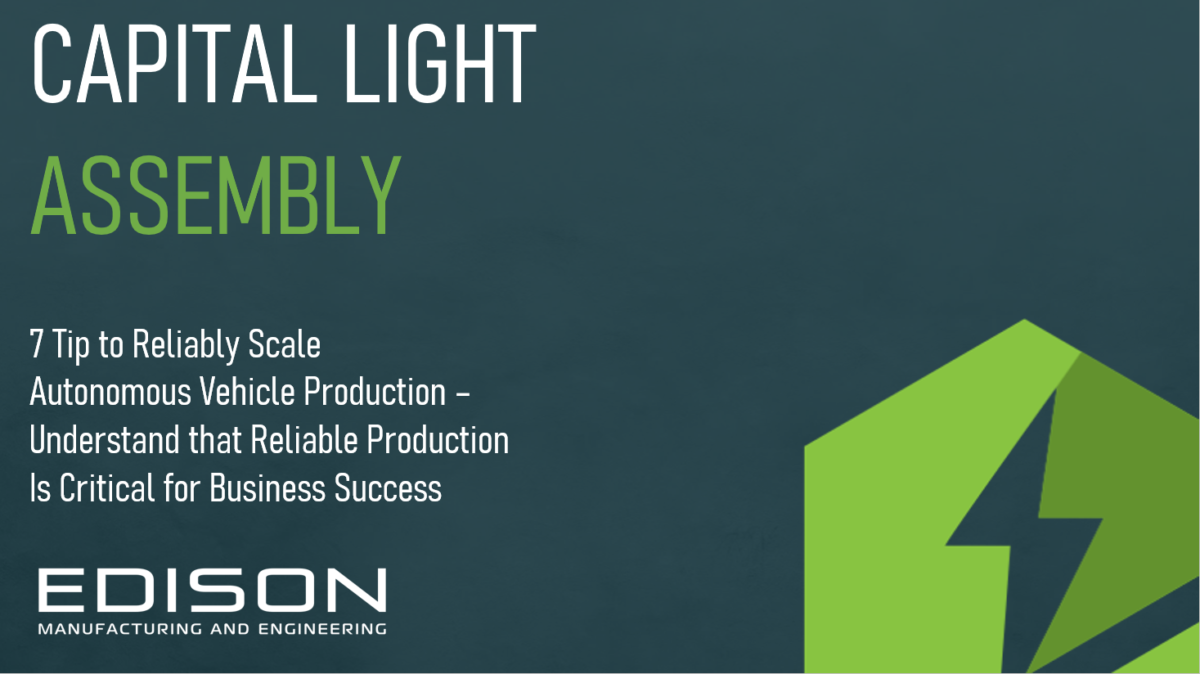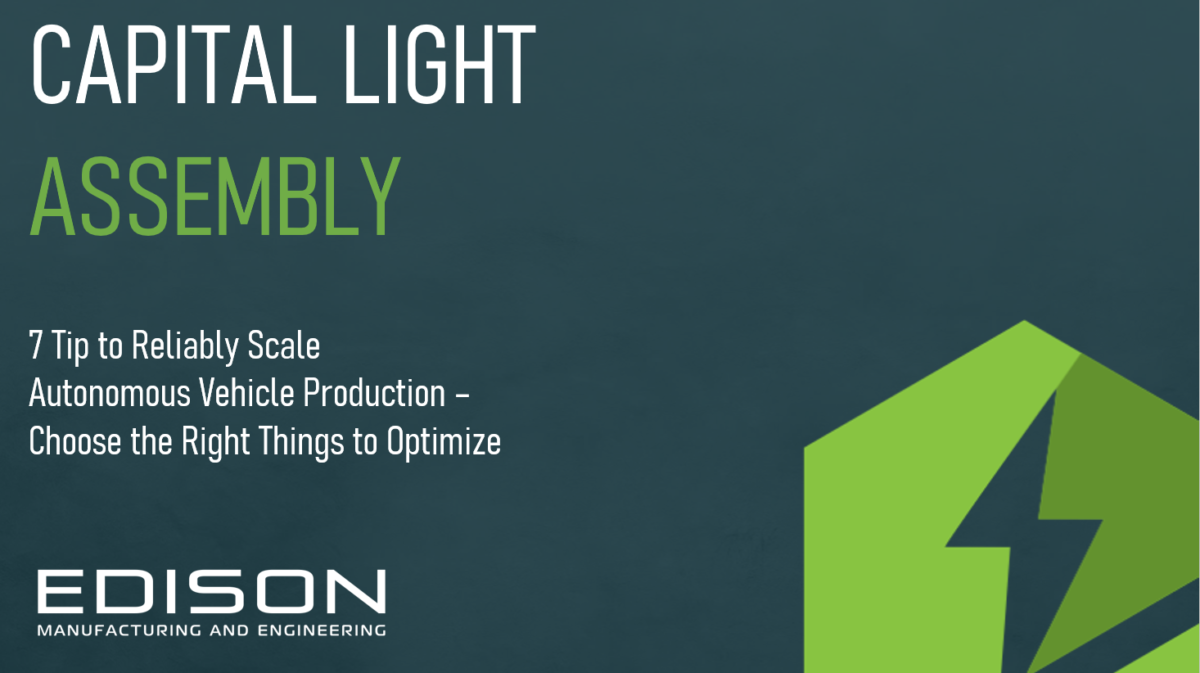In this episode, Brandon Bartneck, the Vice President and General Manager of Edison, shares valuable insights on the manufacturing approach adopted by Edison. Throughout the episode, Bartneck focuses on the "why" behind Edison's approach, emphasizing the significance of flexibility, quality, and capital preservation while transitioning from proof of concepts and engineering builds into low-volume production.
Bartneck delves into the nuances of each of these aspects, highlighting how flexibility in manufacturing helps you adapt to the ever-changing market demands while ensuring that the quality of the product remains uncompromised. He stresses the importance of quality control measures to prevent defects and maintain consistency in the production process. Furthermore, he underscores the need for capital preservation while scaling up production to minimize the risk of overinvestment.
Overall, this episode provides a comprehensive understanding of Edison's manufacturing approach and is a must-listen for anyone looking to gain insights into the intricacies of manufacturing at scale.
Key Takeaways:
- It's important to prepare for any unpredictability and be ready to adjust your manufacturing strategy accordingly. This means having the flexibility to modify your approach as needed to keep up with any changes that may arise.
- Prioritizing quality is critical, especially as you establish public perspectives of your product and build the reputation of your business.
- Capital preservation is crucial for manufacturing startups. It's essential to be strategic and intentional about where you put your money to maximize its potential.
Full Transcript:
Welcome to the Capital Light Assembly podcast brought to you by Edison Manufacturing and Engineering. Edison is your low-volume contract manufacturing partner focused on the capital-light assembly of complex mobility and energy products that don't fit neatly within traditional high-volume production. I'm Brandon Bartneck. It's a solo episode today - no guests. We're just talking about a specific type of manufacturing shop, and whereas in a lot of the other episodes, you have to get into the what and the how we're talking about the why. We're talking about what matters to individuals, companies, a group, and teams going through a specific challenge - and that challenge is scaling up from proof of concept to your initial volume run and let's look at it from a startup lens.
So, let's think about a startup company going through this early phase. You have an idea; you have confirmed interests; you have funding likely in the back pocket; you have the ability to - a plan to - go to market; there are people who want this product. You've built the proof of concepts - one-off, two-off, five-off, maybe ten, twenty, who knows what it is, but low volume. Often, it's a group of engineers in a garage. Yeah, maybe not production intent components; there's probably not a great degree of control, network instructions, process flows, or any of these things in place. Really, it's this transition from, okay, we’re an R&D organization, we have this proof of concept, it works, let's scale up. But we're not going straight to fifty hundred thousand annual units because that's a whole different game. At that point, you're talking about heavy automation, standardization, economies of scale, a different approach altogether to manufacturing. What we're talking about here is a startup scaling past this proof-of-concept phase to low- maybe moderate production. So, we're talking about dozens, hundreds, low thousands; I mean, if you want to throw a number out, maybe cap it at ten thousand per year, something like that. How do you do that? What actually matters as you're making these decisions and scaling up? What should be the foundation on which you're building your manufacturing strategy?
So, I talk about it from our experience - Edison's expertise - and the way we've thought about this problem, which we've thought about a lot, and there's really three foundational ideas to build around, and we'll talk about each of these a bit. So, first, flexibility. so, it's cliché, but the only certainty is change. That's certainly true for startups, especially early on, like this stuff; startups have to pivot more often than not; you have a theory, yeah, you try to confirm what's this product going to look like, what's the solution going to look like for the market, where's the market demand, how much is it, when is that coming, how many products are required, all of these things you have stacked - layer upon layer of uncertainty and variability. That often ends up in change early on and change in volume change in the product itself, and so you need a manufacturing approach that can accommodate. You should, of course, look for opportunities to minimize that change. You should do all you can to find standardization, find the ability to get ahead of things, and to make it so each progressive build becomes more and more standard, less and less kind of variable. With that said, the manufacturing approach needs to account for this flexibility. You certainly can't just hope that you get everything right and that all stays the same. I mean, hope is not a strategy, certainly not a good strategy, and not the right approach for manufacturing. You need to plan for this uncertainty and have the ability to react and mold the manufacturing approach as appropriate. So, first thing, first foundational value is flexibility.
The second one here is quality, right? So, this, of course, the proof concept needs to be high quality, needs to do what it says, but there's a higher bar as you start talking about quality from an actual low volume production standpoint. So, these are often units that are going to customers, are going to end users. These individuals might be relying on these products from a safety perspective, they might be relying on them from a business perspective, so relying on the ability of a given product to do its job so that the end user can rely upon some benefit. These products are going to lead to these end users, and possibly the public, forming opinions around the organization whose brand is slapped across them, and it's a representation of that company. So, all these things, and I'm sure there's more that I didn't mention here, but they combine to say quality is a must. You need to be able to, and this isn't traditional automotive quality, so we'll talk about this in future episodes in more detail, but this is a very different approach to quality than when you're building a hundred thousand or something per year. This foundational value is great, but the actual execution - how you do this, often in a manual type of build - looks very different. So, with all that being said, yeah, quality is a must. So the first two values, flexibility, and quality, matter of immense value to a startup that's scaling up from a super low volume concept into lower volume production.
So, then the third one, third and possibly the most important - capital preservation. So, it may not be a surprise based on the name of this podcast, Capital Light Assembly podcast, but this is really the reason. This is so important to us, and the reason that Edison has built our manufacturing approach around this idea of capital-light assembly is that capital preservation is critical for several types of companies, but certainly in this situation that we're talking about here, which is a startup scaling up from super low volume into low volume production, and what I mean, it's probably obvious, but capital is not easy to come by. Often, even if it is, you have to be careful. You have to be really careful with cash flow. So many companies have fallen through because of poor cash management. So being smart with capital early on, really, is an enabler for this other idea of flexibility, right? So if you dump ten million dollars into an automated manufacturing line, or whatever value it is, you now have a boat anchor. You have some costs, you have capital deployed, and as changes come up, which, as we talked about, they will, as changes come up, you have limited your ability to adjust. So, it's almost always worthwhile to be smart with capital and be intentional about where it's being deployed. Find ways to minimize that upfront hurdle that you need to clear before you make money before you're profitable. Maybe that's going to result in a higher piece price out of the gate, but it's more than worth it for the optionality in the risk mitigation that you get on the back end there. So, the ability to make informed decisions, you can see how things play out, see how some of this variability plays out, and make more informed decisions later on the line. At that time, then you make your big bet on where you're deploying your capital, but early on, as you're making the transition from proof of concept into low-volume, medium-volume, mid-volume production, capital preservation is huge.
So, again, this episode isn't meant to be a how-type discussion, necessarily. Stay tuned for other discussions, or some of the ones that have already taken place, to hear kind of how you actually put these things into practice, but this is really a what matters discussion, and as we're talking about, again, to recap, a startup who's going from low volume proof of concept to low volume production and mid-volume production, it's about flexibility, it's about quality, and it is certainly about capital preservation. So, hopefully, that makes sense. Reach out if you have questions or if you have anything to share. I'd love to hear it and chat. And I mean, this is what Edison does, so if you have any questions, if you're going through this yourself if you're a startup founder, someone who's working on this, and you want to chat - more than happy to do so. So, feel free to reach out. With that said, thanks for listening. I really appreciate it, and yes, stay tuned for more!



